Argumentative Essay: Interpersonal Skills in Education (COR109)
VerifiedAdded on 2023/03/20
|6
|1621
|79
Essay
AI Summary
This essay delves into the critical role of interpersonal communication skills in the field of education, focusing on active listening, effective feedback, and effective questioning. The essay begins by defining interpersonal communication and highlighting its importance in various disciplines. It then identifies and explores the three key interpersonal skills essential for teachers: active listening, effective feedback, and effective questioning. The essay discusses the benefits of each skill, such as fostering a positive classroom environment, enhancing teacher-student relationships, and improving student learning outcomes. Active listening is presented as a skill that enhances understanding and builds trust, feedback is shown to improve student performance and self-awareness, and questioning is discussed as a tool for identifying learning gaps and promoting critical thinking. The essay concludes by summarizing the importance of these skills for teachers to excel in their profession, emphasizing how these skills contribute to a more effective and supportive learning environment.

Running head: INTERPERSONAL SKILLS IN EDUCATION
INTERPERSONAL SKILLS IN EDUCATION
Name of the student
Name of the university
Author Note
INTERPERSONAL SKILLS IN EDUCATION
Name of the student
Name of the university
Author Note
Paraphrase This Document
Need a fresh take? Get an instant paraphrase of this document with our AI Paraphraser
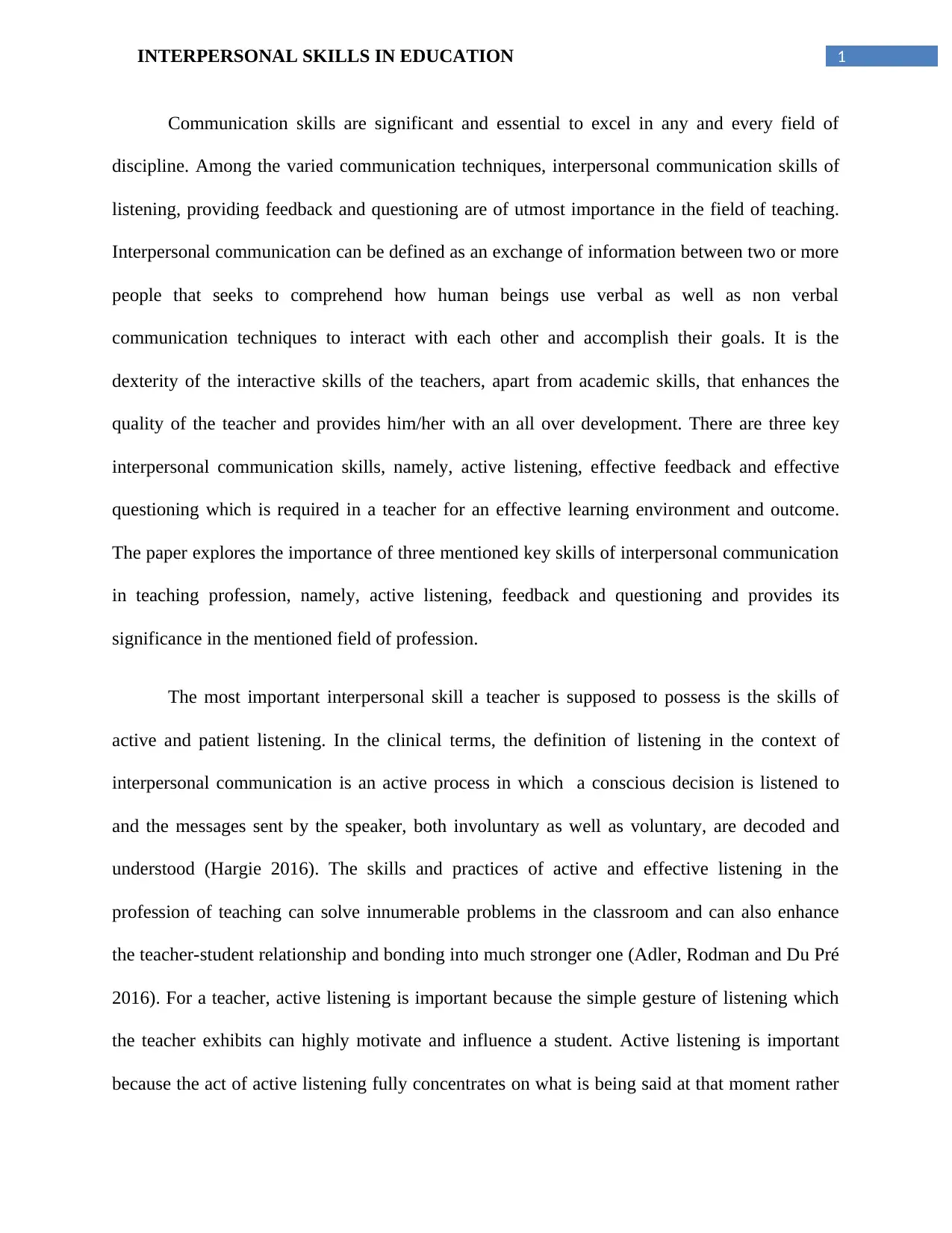
1INTERPERSONAL SKILLS IN EDUCATION
Communication skills are significant and essential to excel in any and every field of
discipline. Among the varied communication techniques, interpersonal communication skills of
listening, providing feedback and questioning are of utmost importance in the field of teaching.
Interpersonal communication can be defined as an exchange of information between two or more
people that seeks to comprehend how human beings use verbal as well as non verbal
communication techniques to interact with each other and accomplish their goals. It is the
dexterity of the interactive skills of the teachers, apart from academic skills, that enhances the
quality of the teacher and provides him/her with an all over development. There are three key
interpersonal communication skills, namely, active listening, effective feedback and effective
questioning which is required in a teacher for an effective learning environment and outcome.
The paper explores the importance of three mentioned key skills of interpersonal communication
in teaching profession, namely, active listening, feedback and questioning and provides its
significance in the mentioned field of profession.
The most important interpersonal skill a teacher is supposed to possess is the skills of
active and patient listening. In the clinical terms, the definition of listening in the context of
interpersonal communication is an active process in which a conscious decision is listened to
and the messages sent by the speaker, both involuntary as well as voluntary, are decoded and
understood (Hargie 2016). The skills and practices of active and effective listening in the
profession of teaching can solve innumerable problems in the classroom and can also enhance
the teacher-student relationship and bonding into much stronger one (Adler, Rodman and Du Pré
2016). For a teacher, active listening is important because the simple gesture of listening which
the teacher exhibits can highly motivate and influence a student. Active listening is important
because the act of active listening fully concentrates on what is being said at that moment rather
Communication skills are significant and essential to excel in any and every field of
discipline. Among the varied communication techniques, interpersonal communication skills of
listening, providing feedback and questioning are of utmost importance in the field of teaching.
Interpersonal communication can be defined as an exchange of information between two or more
people that seeks to comprehend how human beings use verbal as well as non verbal
communication techniques to interact with each other and accomplish their goals. It is the
dexterity of the interactive skills of the teachers, apart from academic skills, that enhances the
quality of the teacher and provides him/her with an all over development. There are three key
interpersonal communication skills, namely, active listening, effective feedback and effective
questioning which is required in a teacher for an effective learning environment and outcome.
The paper explores the importance of three mentioned key skills of interpersonal communication
in teaching profession, namely, active listening, feedback and questioning and provides its
significance in the mentioned field of profession.
The most important interpersonal skill a teacher is supposed to possess is the skills of
active and patient listening. In the clinical terms, the definition of listening in the context of
interpersonal communication is an active process in which a conscious decision is listened to
and the messages sent by the speaker, both involuntary as well as voluntary, are decoded and
understood (Hargie 2016). The skills and practices of active and effective listening in the
profession of teaching can solve innumerable problems in the classroom and can also enhance
the teacher-student relationship and bonding into much stronger one (Adler, Rodman and Du Pré
2016). For a teacher, active listening is important because the simple gesture of listening which
the teacher exhibits can highly motivate and influence a student. Active listening is important
because the act of active listening fully concentrates on what is being said at that moment rather
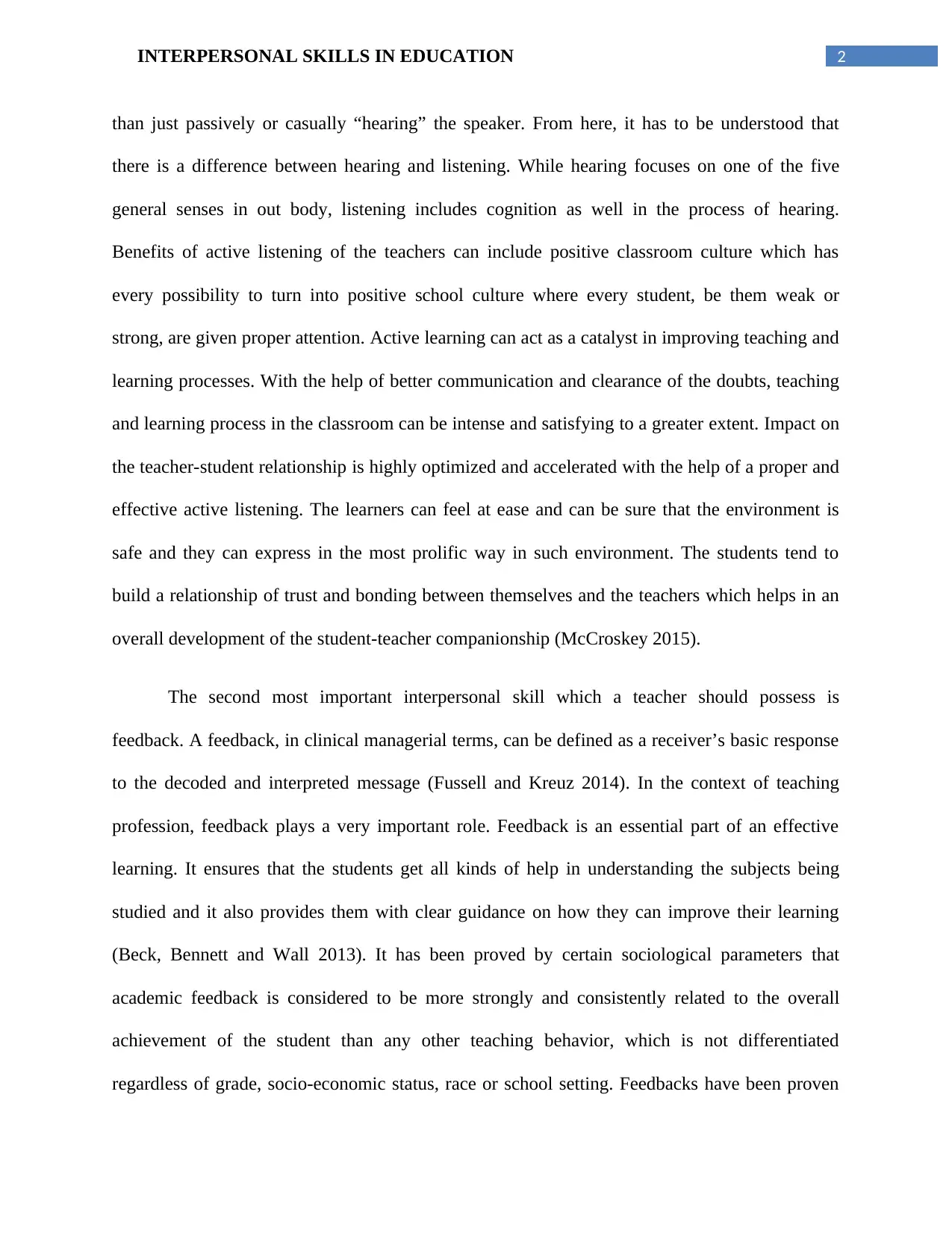
2INTERPERSONAL SKILLS IN EDUCATION
than just passively or casually “hearing” the speaker. From here, it has to be understood that
there is a difference between hearing and listening. While hearing focuses on one of the five
general senses in out body, listening includes cognition as well in the process of hearing.
Benefits of active listening of the teachers can include positive classroom culture which has
every possibility to turn into positive school culture where every student, be them weak or
strong, are given proper attention. Active learning can act as a catalyst in improving teaching and
learning processes. With the help of better communication and clearance of the doubts, teaching
and learning process in the classroom can be intense and satisfying to a greater extent. Impact on
the teacher-student relationship is highly optimized and accelerated with the help of a proper and
effective active listening. The learners can feel at ease and can be sure that the environment is
safe and they can express in the most prolific way in such environment. The students tend to
build a relationship of trust and bonding between themselves and the teachers which helps in an
overall development of the student-teacher companionship (McCroskey 2015).
The second most important interpersonal skill which a teacher should possess is
feedback. A feedback, in clinical managerial terms, can be defined as a receiver’s basic response
to the decoded and interpreted message (Fussell and Kreuz 2014). In the context of teaching
profession, feedback plays a very important role. Feedback is an essential part of an effective
learning. It ensures that the students get all kinds of help in understanding the subjects being
studied and it also provides them with clear guidance on how they can improve their learning
(Beck, Bennett and Wall 2013). It has been proved by certain sociological parameters that
academic feedback is considered to be more strongly and consistently related to the overall
achievement of the student than any other teaching behavior, which is not differentiated
regardless of grade, socio-economic status, race or school setting. Feedbacks have been proven
than just passively or casually “hearing” the speaker. From here, it has to be understood that
there is a difference between hearing and listening. While hearing focuses on one of the five
general senses in out body, listening includes cognition as well in the process of hearing.
Benefits of active listening of the teachers can include positive classroom culture which has
every possibility to turn into positive school culture where every student, be them weak or
strong, are given proper attention. Active learning can act as a catalyst in improving teaching and
learning processes. With the help of better communication and clearance of the doubts, teaching
and learning process in the classroom can be intense and satisfying to a greater extent. Impact on
the teacher-student relationship is highly optimized and accelerated with the help of a proper and
effective active listening. The learners can feel at ease and can be sure that the environment is
safe and they can express in the most prolific way in such environment. The students tend to
build a relationship of trust and bonding between themselves and the teachers which helps in an
overall development of the student-teacher companionship (McCroskey 2015).
The second most important interpersonal skill which a teacher should possess is
feedback. A feedback, in clinical managerial terms, can be defined as a receiver’s basic response
to the decoded and interpreted message (Fussell and Kreuz 2014). In the context of teaching
profession, feedback plays a very important role. Feedback is an essential part of an effective
learning. It ensures that the students get all kinds of help in understanding the subjects being
studied and it also provides them with clear guidance on how they can improve their learning
(Beck, Bennett and Wall 2013). It has been proved by certain sociological parameters that
academic feedback is considered to be more strongly and consistently related to the overall
achievement of the student than any other teaching behavior, which is not differentiated
regardless of grade, socio-economic status, race or school setting. Feedbacks have been proven
⊘ This is a preview!⊘
Do you want full access?
Subscribe today to unlock all pages.

Trusted by 1+ million students worldwide
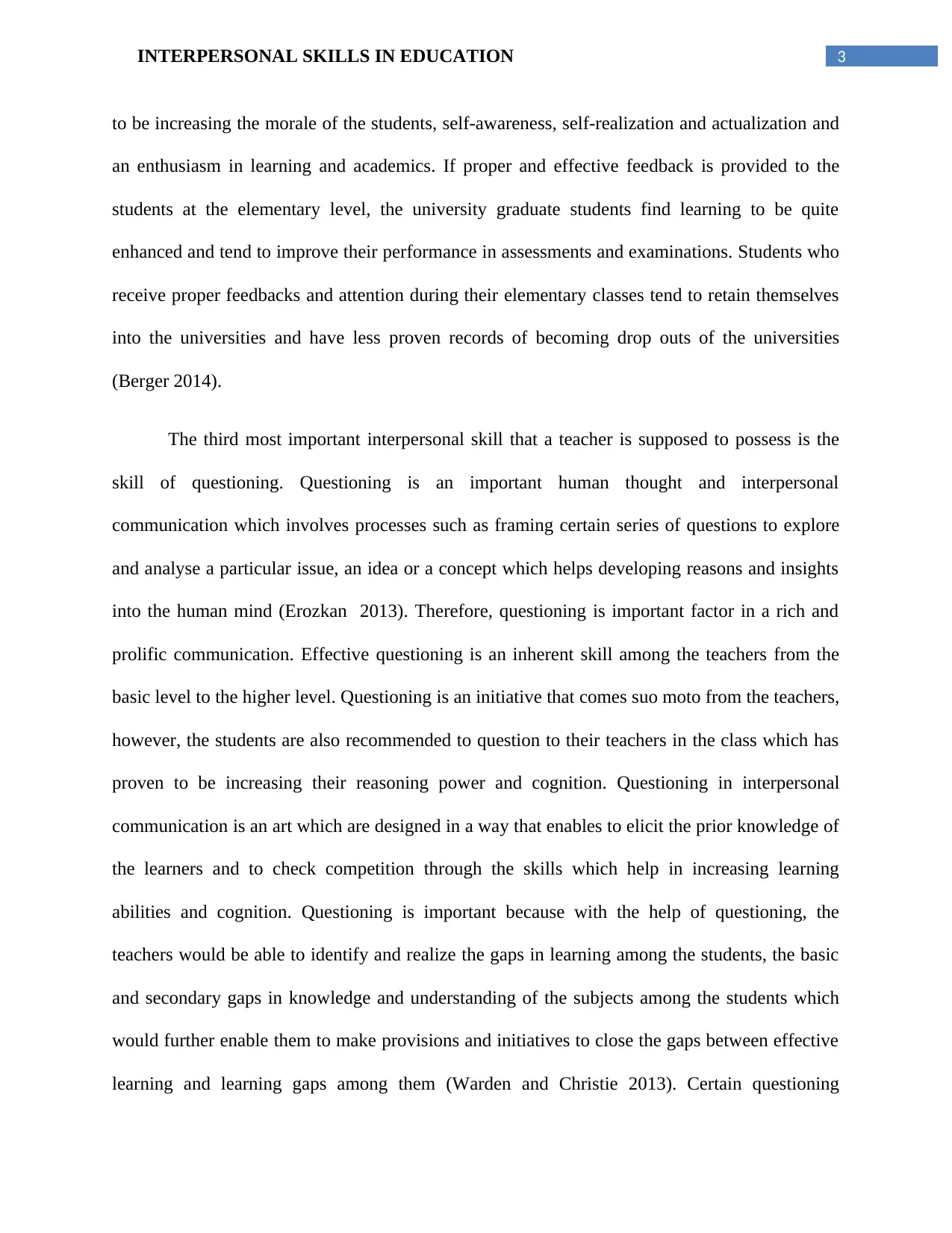
3INTERPERSONAL SKILLS IN EDUCATION
to be increasing the morale of the students, self-awareness, self-realization and actualization and
an enthusiasm in learning and academics. If proper and effective feedback is provided to the
students at the elementary level, the university graduate students find learning to be quite
enhanced and tend to improve their performance in assessments and examinations. Students who
receive proper feedbacks and attention during their elementary classes tend to retain themselves
into the universities and have less proven records of becoming drop outs of the universities
(Berger 2014).
The third most important interpersonal skill that a teacher is supposed to possess is the
skill of questioning. Questioning is an important human thought and interpersonal
communication which involves processes such as framing certain series of questions to explore
and analyse a particular issue, an idea or a concept which helps developing reasons and insights
into the human mind (Erozkan 2013). Therefore, questioning is important factor in a rich and
prolific communication. Effective questioning is an inherent skill among the teachers from the
basic level to the higher level. Questioning is an initiative that comes suo moto from the teachers,
however, the students are also recommended to question to their teachers in the class which has
proven to be increasing their reasoning power and cognition. Questioning in interpersonal
communication is an art which are designed in a way that enables to elicit the prior knowledge of
the learners and to check competition through the skills which help in increasing learning
abilities and cognition. Questioning is important because with the help of questioning, the
teachers would be able to identify and realize the gaps in learning among the students, the basic
and secondary gaps in knowledge and understanding of the subjects among the students which
would further enable them to make provisions and initiatives to close the gaps between effective
learning and learning gaps among them (Warden and Christie 2013). Certain questioning
to be increasing the morale of the students, self-awareness, self-realization and actualization and
an enthusiasm in learning and academics. If proper and effective feedback is provided to the
students at the elementary level, the university graduate students find learning to be quite
enhanced and tend to improve their performance in assessments and examinations. Students who
receive proper feedbacks and attention during their elementary classes tend to retain themselves
into the universities and have less proven records of becoming drop outs of the universities
(Berger 2014).
The third most important interpersonal skill that a teacher is supposed to possess is the
skill of questioning. Questioning is an important human thought and interpersonal
communication which involves processes such as framing certain series of questions to explore
and analyse a particular issue, an idea or a concept which helps developing reasons and insights
into the human mind (Erozkan 2013). Therefore, questioning is important factor in a rich and
prolific communication. Effective questioning is an inherent skill among the teachers from the
basic level to the higher level. Questioning is an initiative that comes suo moto from the teachers,
however, the students are also recommended to question to their teachers in the class which has
proven to be increasing their reasoning power and cognition. Questioning in interpersonal
communication is an art which are designed in a way that enables to elicit the prior knowledge of
the learners and to check competition through the skills which help in increasing learning
abilities and cognition. Questioning is important because with the help of questioning, the
teachers would be able to identify and realize the gaps in learning among the students, the basic
and secondary gaps in knowledge and understanding of the subjects among the students which
would further enable them to make provisions and initiatives to close the gaps between effective
learning and learning gaps among them (Warden and Christie 2013). Certain questioning
Paraphrase This Document
Need a fresh take? Get an instant paraphrase of this document with our AI Paraphraser
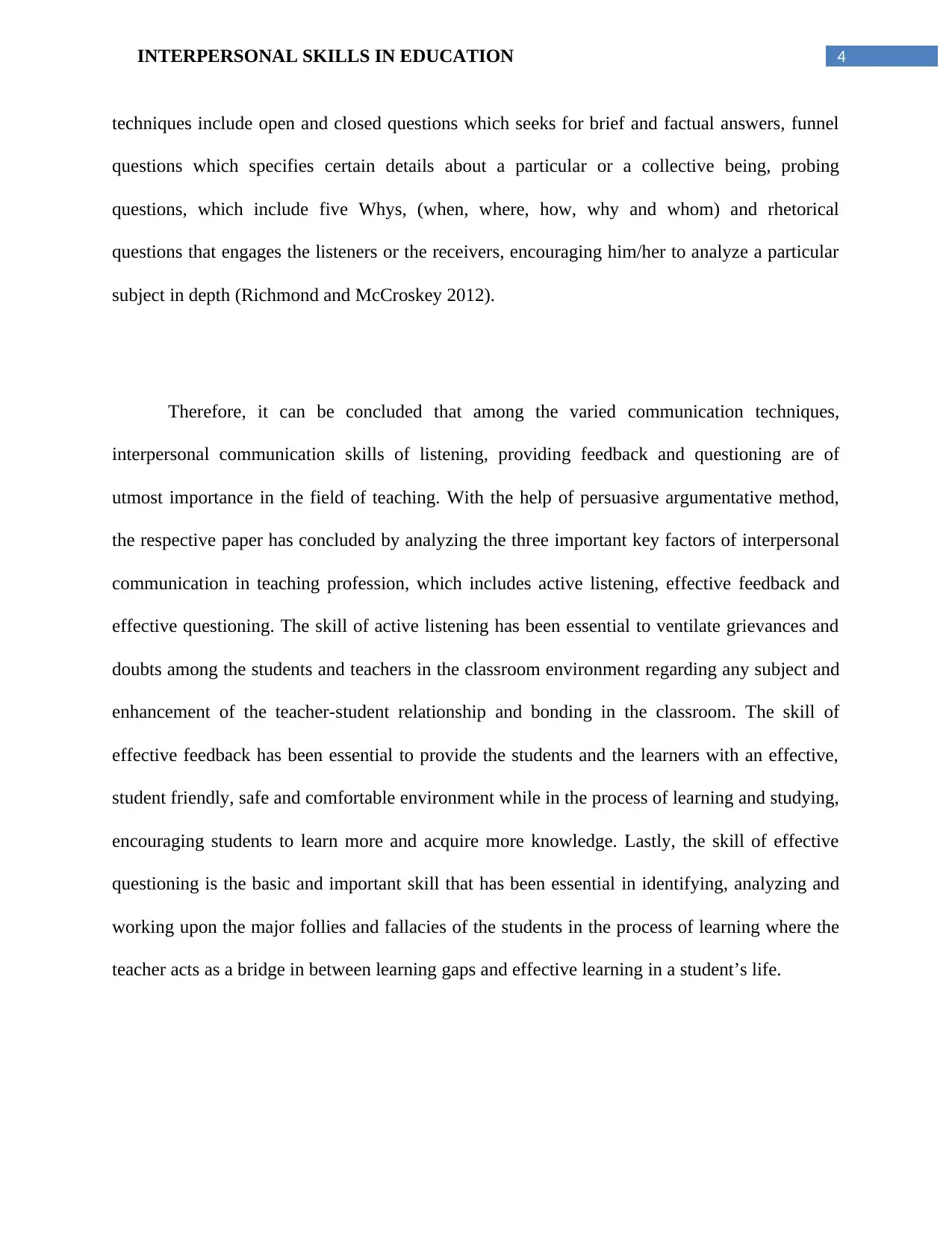
4INTERPERSONAL SKILLS IN EDUCATION
techniques include open and closed questions which seeks for brief and factual answers, funnel
questions which specifies certain details about a particular or a collective being, probing
questions, which include five Whys, (when, where, how, why and whom) and rhetorical
questions that engages the listeners or the receivers, encouraging him/her to analyze a particular
subject in depth (Richmond and McCroskey 2012).
Therefore, it can be concluded that among the varied communication techniques,
interpersonal communication skills of listening, providing feedback and questioning are of
utmost importance in the field of teaching. With the help of persuasive argumentative method,
the respective paper has concluded by analyzing the three important key factors of interpersonal
communication in teaching profession, which includes active listening, effective feedback and
effective questioning. The skill of active listening has been essential to ventilate grievances and
doubts among the students and teachers in the classroom environment regarding any subject and
enhancement of the teacher-student relationship and bonding in the classroom. The skill of
effective feedback has been essential to provide the students and the learners with an effective,
student friendly, safe and comfortable environment while in the process of learning and studying,
encouraging students to learn more and acquire more knowledge. Lastly, the skill of effective
questioning is the basic and important skill that has been essential in identifying, analyzing and
working upon the major follies and fallacies of the students in the process of learning where the
teacher acts as a bridge in between learning gaps and effective learning in a student’s life.
techniques include open and closed questions which seeks for brief and factual answers, funnel
questions which specifies certain details about a particular or a collective being, probing
questions, which include five Whys, (when, where, how, why and whom) and rhetorical
questions that engages the listeners or the receivers, encouraging him/her to analyze a particular
subject in depth (Richmond and McCroskey 2012).
Therefore, it can be concluded that among the varied communication techniques,
interpersonal communication skills of listening, providing feedback and questioning are of
utmost importance in the field of teaching. With the help of persuasive argumentative method,
the respective paper has concluded by analyzing the three important key factors of interpersonal
communication in teaching profession, which includes active listening, effective feedback and
effective questioning. The skill of active listening has been essential to ventilate grievances and
doubts among the students and teachers in the classroom environment regarding any subject and
enhancement of the teacher-student relationship and bonding in the classroom. The skill of
effective feedback has been essential to provide the students and the learners with an effective,
student friendly, safe and comfortable environment while in the process of learning and studying,
encouraging students to learn more and acquire more knowledge. Lastly, the skill of effective
questioning is the basic and important skill that has been essential in identifying, analyzing and
working upon the major follies and fallacies of the students in the process of learning where the
teacher acts as a bridge in between learning gaps and effective learning in a student’s life.
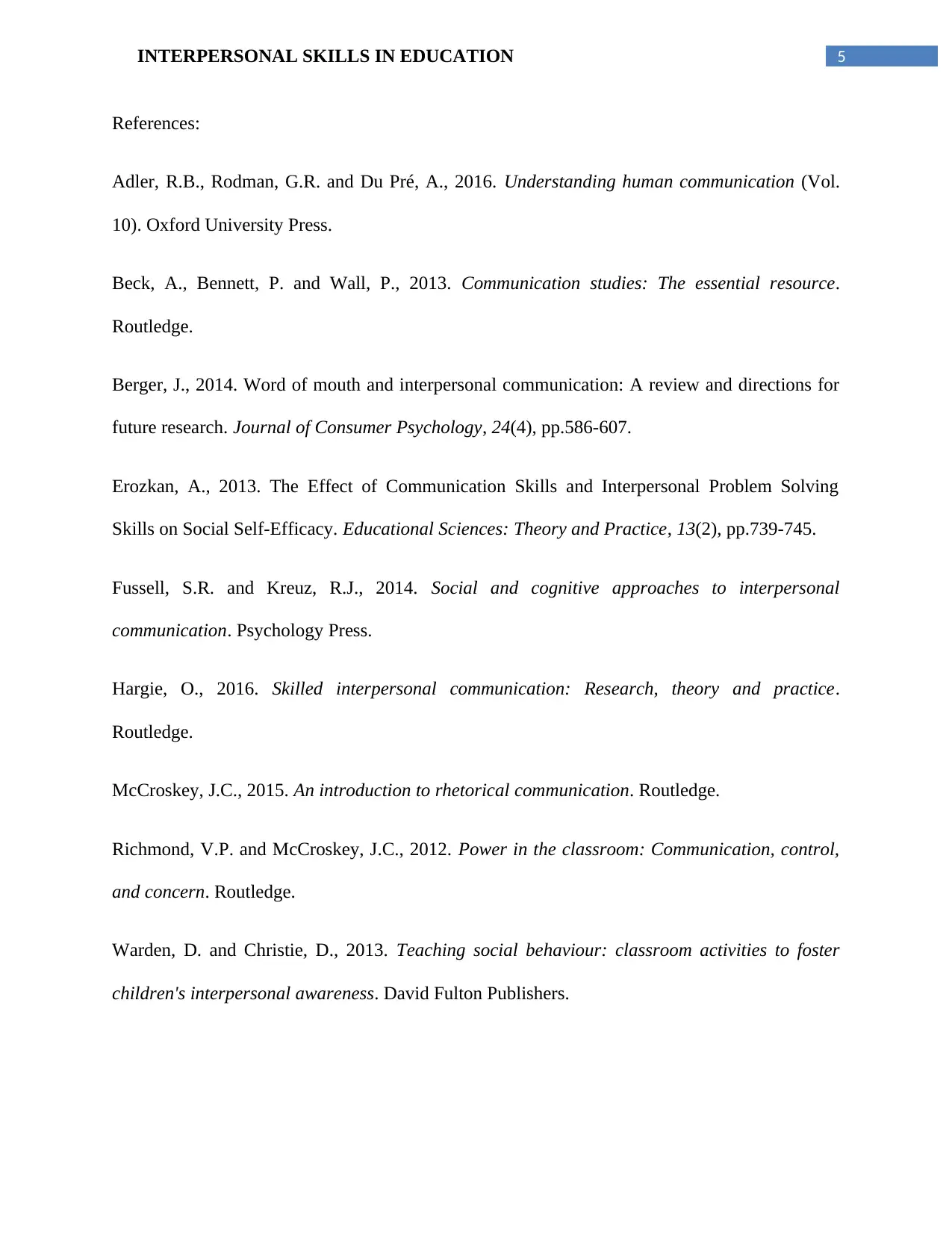
5INTERPERSONAL SKILLS IN EDUCATION
References:
Adler, R.B., Rodman, G.R. and Du Pré, A., 2016. Understanding human communication (Vol.
10). Oxford University Press.
Beck, A., Bennett, P. and Wall, P., 2013. Communication studies: The essential resource.
Routledge.
Berger, J., 2014. Word of mouth and interpersonal communication: A review and directions for
future research. Journal of Consumer Psychology, 24(4), pp.586-607.
Erozkan, A., 2013. The Effect of Communication Skills and Interpersonal Problem Solving
Skills on Social Self-Efficacy. Educational Sciences: Theory and Practice, 13(2), pp.739-745.
Fussell, S.R. and Kreuz, R.J., 2014. Social and cognitive approaches to interpersonal
communication. Psychology Press.
Hargie, O., 2016. Skilled interpersonal communication: Research, theory and practice.
Routledge.
McCroskey, J.C., 2015. An introduction to rhetorical communication. Routledge.
Richmond, V.P. and McCroskey, J.C., 2012. Power in the classroom: Communication, control,
and concern. Routledge.
Warden, D. and Christie, D., 2013. Teaching social behaviour: classroom activities to foster
children's interpersonal awareness. David Fulton Publishers.
References:
Adler, R.B., Rodman, G.R. and Du Pré, A., 2016. Understanding human communication (Vol.
10). Oxford University Press.
Beck, A., Bennett, P. and Wall, P., 2013. Communication studies: The essential resource.
Routledge.
Berger, J., 2014. Word of mouth and interpersonal communication: A review and directions for
future research. Journal of Consumer Psychology, 24(4), pp.586-607.
Erozkan, A., 2013. The Effect of Communication Skills and Interpersonal Problem Solving
Skills on Social Self-Efficacy. Educational Sciences: Theory and Practice, 13(2), pp.739-745.
Fussell, S.R. and Kreuz, R.J., 2014. Social and cognitive approaches to interpersonal
communication. Psychology Press.
Hargie, O., 2016. Skilled interpersonal communication: Research, theory and practice.
Routledge.
McCroskey, J.C., 2015. An introduction to rhetorical communication. Routledge.
Richmond, V.P. and McCroskey, J.C., 2012. Power in the classroom: Communication, control,
and concern. Routledge.
Warden, D. and Christie, D., 2013. Teaching social behaviour: classroom activities to foster
children's interpersonal awareness. David Fulton Publishers.
⊘ This is a preview!⊘
Do you want full access?
Subscribe today to unlock all pages.

Trusted by 1+ million students worldwide
1 out of 6
Related Documents
Your All-in-One AI-Powered Toolkit for Academic Success.
+13062052269
info@desklib.com
Available 24*7 on WhatsApp / Email
![[object Object]](/_next/static/media/star-bottom.7253800d.svg)
Unlock your academic potential
Copyright © 2020–2026 A2Z Services. All Rights Reserved. Developed and managed by ZUCOL.





